2020年中考英语一轮教材复习课件:8年级下册Units 1-2
文档属性
| 名称 | 2020年中考英语一轮教材复习课件:8年级下册Units 1-2 | 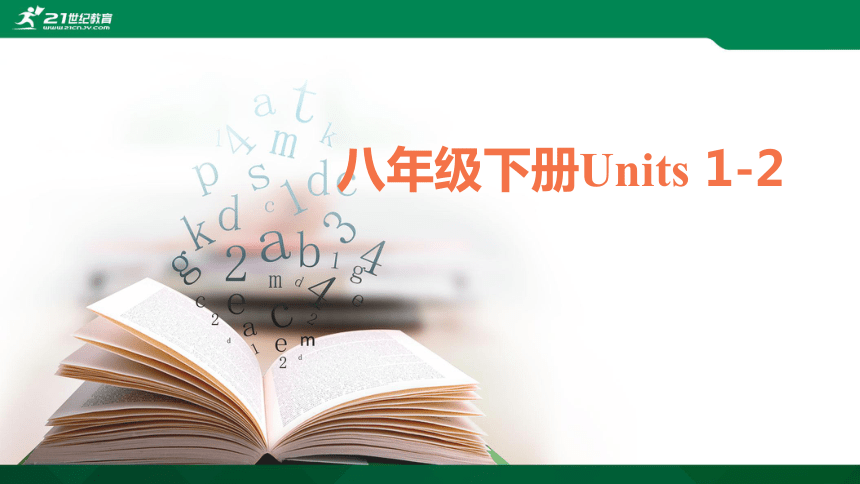 | |
| 格式 | zip | ||
| 文件大小 | 1.8MB | ||
| 资源类型 | 试卷 | ||
| 版本资源 | 人教新目标(Go for it)版 | ||
| 科目 | 英语 | ||
| 更新时间 | 2020-02-21 15:25:28 | ||
图片预览

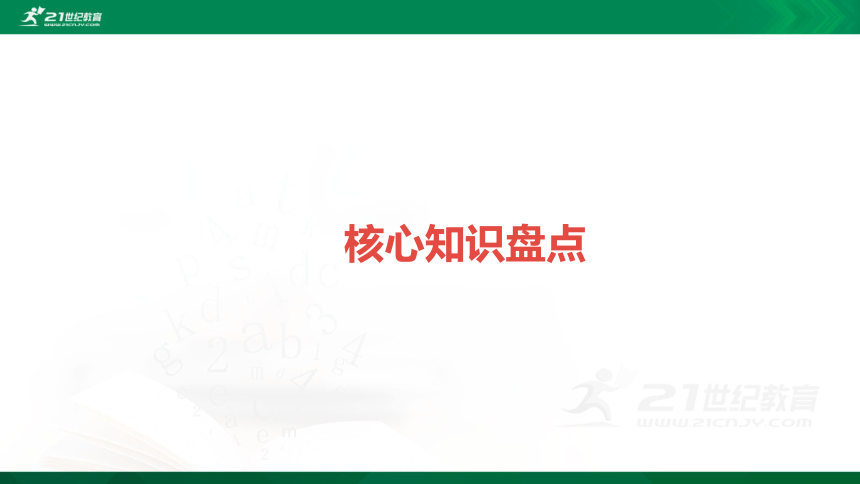
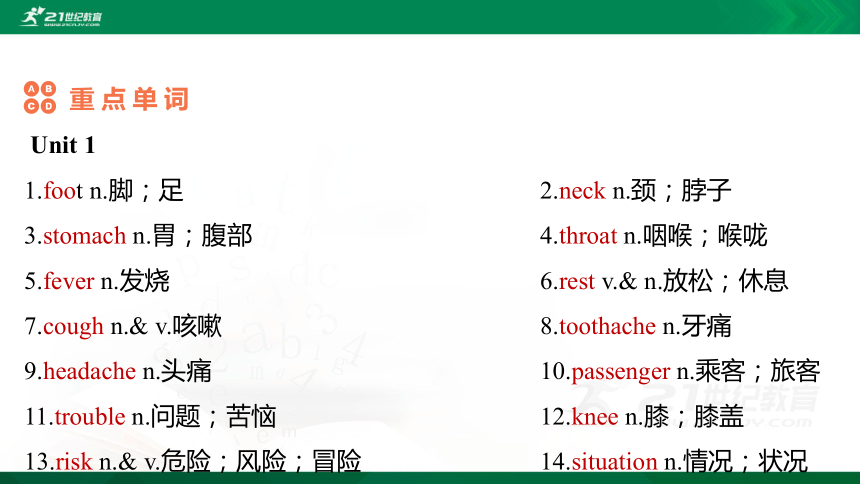
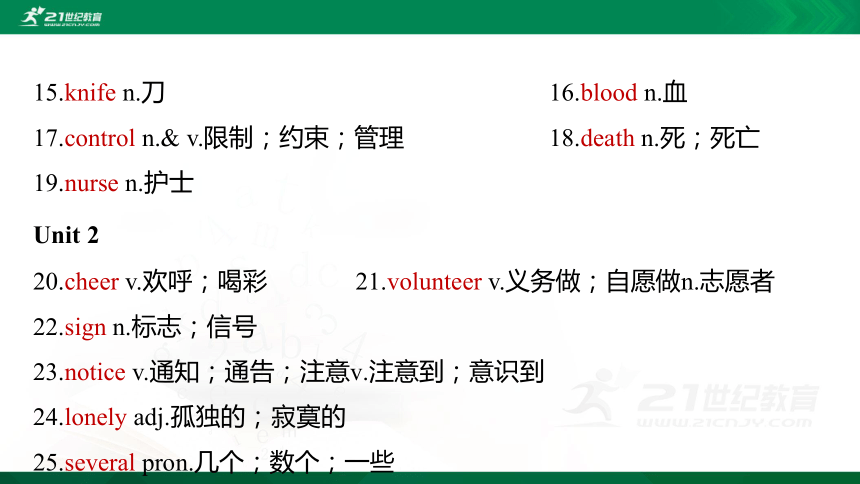
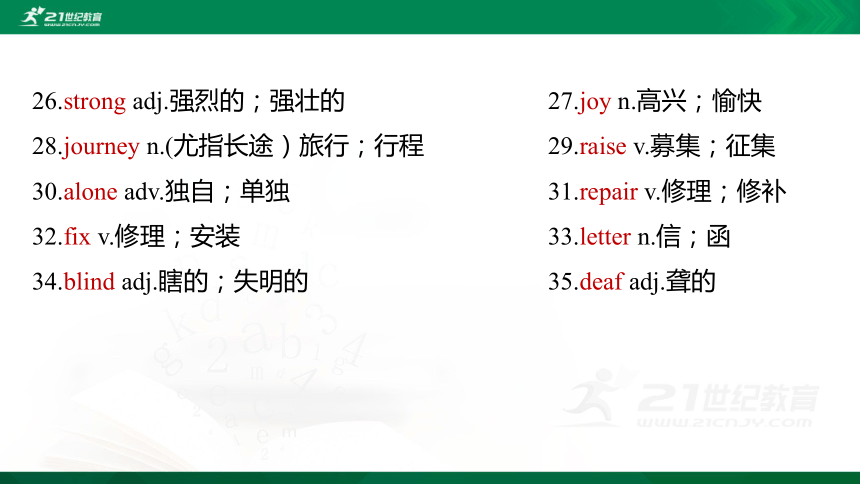
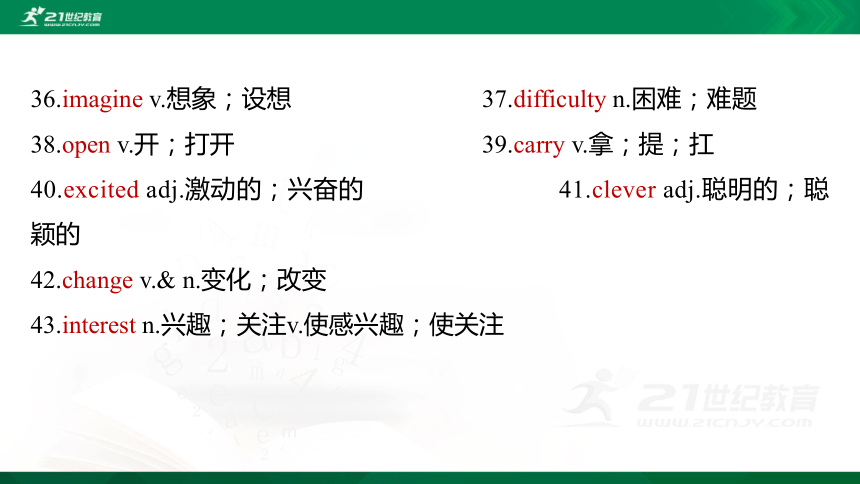
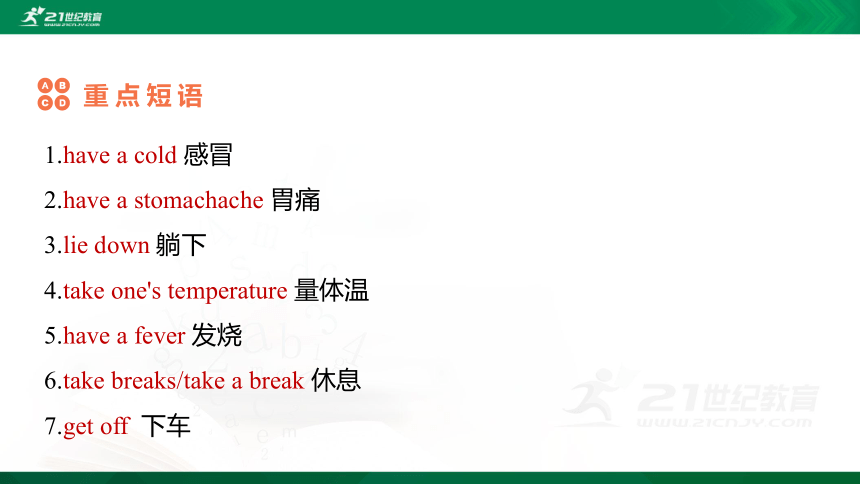
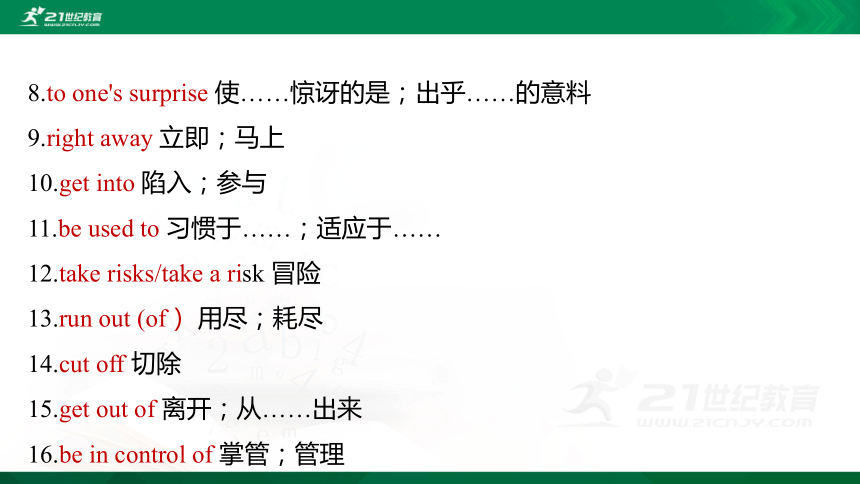
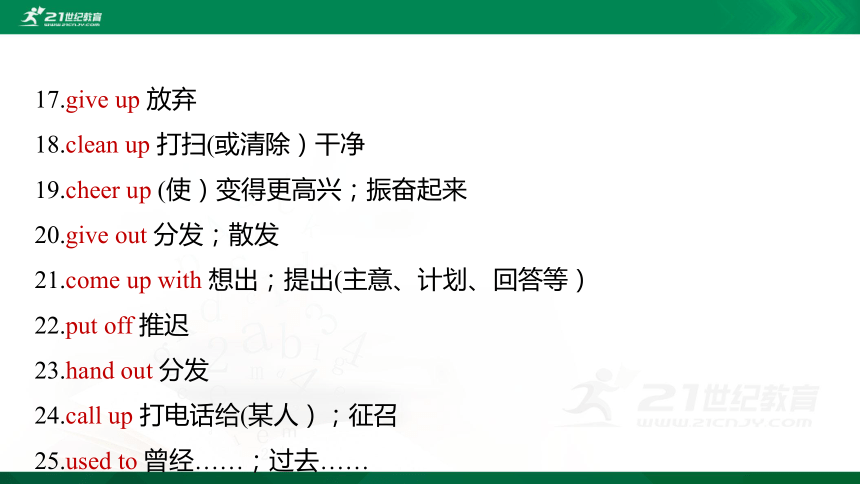
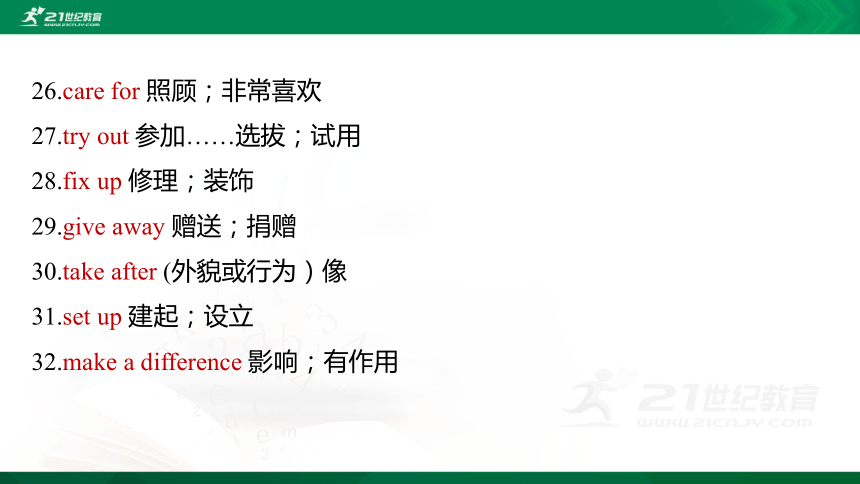
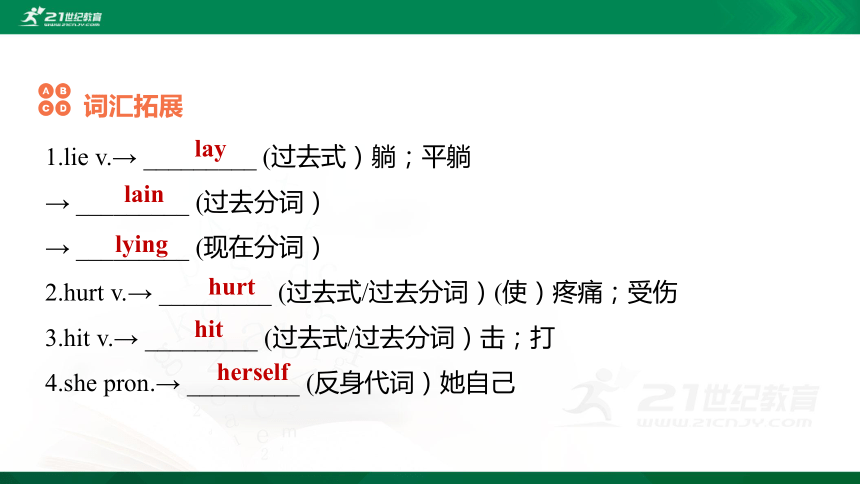
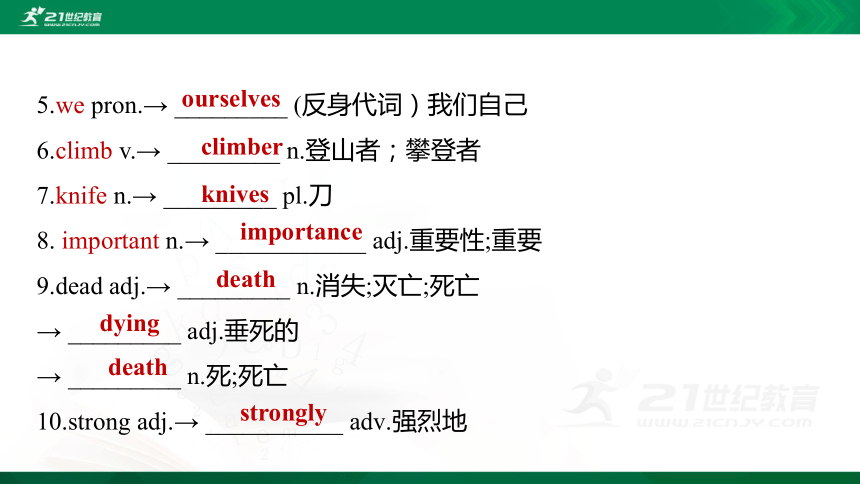
文档简介
(共72张PPT)
八年级下册Units 1-2
核心知识盘点
1.foot n.脚;足 2.neck n.颈;脖子
3.stomach n.胃;腹部 4.throat n.咽喉;喉咙
5.fever n.发烧 6.rest v.& n.放松;休息
7.cough n.& v.咳嗽 8.toothache n.牙痛
9.headache n.头痛 10.passenger n.乘客;旅客
11.trouble n.问题;苦恼 12.knee n.膝;膝盖
13.risk n.& v.危险;风险;冒险 14.situation n.情况;状况
重 点 单 词
Unit 1
15.knife n.刀 16.blood n.血
17.control n.& v.限制;约束;管理 18.death n.死;死亡
19.nurse n.护士
Unit 2
20.cheer v.欢呼;喝彩 21.volunteer v.义务做;自愿做n.志愿者
22.sign n.标志;信号
23.notice v.通知;通告;注意v.注意到;意识到
24.lonely adj.孤独的;寂寞的
25.several pron.几个;数个;一些
26.strong adj.强烈的;强壮的 27.joy n.高兴;愉快
28.journey n.(尤指长途)旅行;行程 29.raise v.募集;征集
30.alone adv.独自;单独 31.repair v.修理;修补
32.fix v.修理;安装 33.letter n.信;函
34.blind adj.瞎的;失明的 35.deaf adj.聋的
36.imagine v.想象;设想 37.difficulty n.困难;难题
38.open v.开;打开 39.carry v.拿;提;扛
40.excited adj.激动的;兴奋的 41.clever adj.聪明的;聪颖的
42.change v.& n.变化;改变
43.interest n.兴趣;关注v.使感兴趣;使关注
1.have a cold 感冒
2.have a stomachache 胃痛
3.lie down 躺下
4.take one's temperature 量体温
5.have a fever 发烧
6.take breaks/take a break 休息
7.get off 下车
重 点 短 语
8.to one's surprise 使……惊讶的是;出乎……的意料
9.right away 立即;马上
10.get into 陷入;参与
11.be used to 习惯于……;适应于……
12.take risks/take a risk 冒险
13.run out (of) 用尽;耗尽
14.cut off 切除
15.get out of 离开;从……出来
16.be in control of 掌管;管理
17.give up 放弃
18.clean up 打扫(或清除)干净
19.cheer up (使)变得更高兴;振奋起来
20.give out 分发;散发
21.come up with 想出;提出(主意、计划、回答等)
22.put off 推迟
23.hand out 分发
24.call up 打电话给(某人);征召
25.used to 曾经……;过去……
26.care for 照顾;非常喜欢
27.try out 参加……选拔;试用
28.fix up 修理;装饰
29.give away 赠送;捐赠
30.take after (外貌或行为)像
31.set up 建起;设立
32.make a difference 影响;有作用
1.lie v.→ _________ (过去式)躺;平躺
→ _________ (过去分词)
→ _________ (现在分词)
2.hurt v.→ _________ (过去式/过去分词)(使)疼痛;受伤
3.hit v.→ _________ (过去式/过去分词)击;打
4.she pron.→ _________ (反身代词)她自己
词汇拓展
lay
lain
lying
hurt
hit
herself
5.we pron.→ _________ (反身代词)我们自己
6.climb v.→ _________ n.登山者;攀登者
7.knife n.→ _________ pl.刀
8. important n.→ ____________ adj.重要性;重要
9.dead adj.→ _________ n.消失;灭亡;死亡
→ _________ adj.垂死的
→ _________ n.死;死亡
10.strong adj.→ ___________ adv.强烈地
ourselves
climber
knives
importance
death
dying
death
strongly
11.own v.→ _________ n.物主;主人
12.satisfy v.→ ____________ n.满足;满意
→ ___________ adj.满足的;满意的
13.break v.→ _________ adj.破损的;残缺的
14.able adj.→ _________ (反义词)丧失能力的;有残疾的
15.imagine v.→ ___________ n.想象;想象力
16.train v.→ _________ n.训练;培训
17.kind adj.→ ___________ n.仁慈;善良
owner
satisfaction
satisfied
broken
disabled
imagination
training
kindness
1.But _________ _________ _________ ,they all _________ _________ go with him.
但令他惊讶的是,他们都同意和他一起去。
2. _________ _________ Mr.Wang and the passengers,the man _________ _________ by the doctors in time.
多亏了王先生和乘客们,医生及时挽救了老人的生命。
3.His love for mountain climbing is _________ great _________ he _________ _________ _________ mountains even after this experience.
他对登山如此痴迷,以至于在这次(断臂)经历之后他依然继续登山。
重 点 句 型
to
his
surprise
agreed
to
Thanks
to
was
saved
so
that
kept
on
climbing
4.They told me stories about the past and _________ things _________ _________ _________ .
他们给我讲过去的生活经历,讲过去是什么样子的。
5.She could read _________ _________ _________ _________ _________ ______ four.
她在四岁时就能够独自看书了。
6.You could _________ hospitals _________ _________ you _________ the kids and _________ _________ _________ .
你可以请求医院让你去看望孩子们并使他们振作起来。
how
used
to
be
by
herself
the
age
of
at
ask
to
let
visit
cheer
them
up
7.You helped to _________ _________ _________ for me to have Lucky.
有了你的帮助,我才有可能拥有“幸运儿”(狗名)。
make
it
possible
询问情况
1.—What's the matter with Ben?/What happened to Ben? 本怎么啦?
—He hurt himself.He has a sore back. 他弄伤自己了。他背疼。
2.—Do you have a fever? 你发烧吗?
—Yes,I do./No,I don't./I don't know.
是的。/不,不发烧。/我不知道。
3.—Are you OK? 你还好吗?
—No,I don't feel well./I have a headache and I can't move my neck.
不,我感觉不舒服。/我头痛,脖子动不了。
情 景 交 际
给出建议
4.—What should she do? 她应该做什么?
—She should take her temperature. 她应该量体温。
5.—Should I put some medicine on it? 我应该在上面敷点药吗?
—Yes,you should./No,you shouldn't. 是的,你应该。/不,你不应该。
6.—I think you should see a doctor and get an X-ray.
我认为你该去看医生,照X光。
—OK,thanks.I'll do that now. 好的,谢谢。我现在就去。
语 法
话 题
1.情态动词should,shouldn't,could用于提建议
2.反身代词
3.动词不定式作宾语、目的状语和宾语补足语
4.短语动词
Unit 1 健康与急救
Unit 2 志愿服务与慈善
教材考点解析
—What's the matter?你怎么了?
—I have a stomachache.我胃疼。(Unit 1 P1)
【点拨】What's the matter?=What's wrong/the trouble?用来询问病情或某人遇到什么麻烦、问题。其后跟询问的对象时,与介词with连用。答语常为表示身体状况或者用来表达所处困境的句式。如:
—What's wrong with the boy? 这个男孩怎么了?
—He has a cold. 他感冒了。
考点一
【拓展】 要询问“某人怎么了?”,常用以下句型:
( )1.(2019·湘西改编)—Hi,Bob.You don't look well.What's the matter ______ you?
—I talked too much and didn't have any water last night.I have a sore throat now.
A.in B.of C.with
( )2.—__________,doctor?
—He has a toothache.
A.What can I do for him B.Can I help you C.What's wrong with my son
C
学以致用
C
I think you should lie down and rest.
我认为你应当躺下休息。(Unit 1 P2)
【辨析】lie与lay
考点二
单词 词性 词义 过去式 过去分词 现在分词
lie 动词 躺;位于 lay lain lying
说谎 lied lied lying
lay 动词 放置;下蛋 laid laid laying
lie 名词 谎言
He lay on the beach.
他躺在沙滩上。
The cinema lies in the center of the city.
电影院位于市中心。
She lied to her mother.
她对她妈妈撒谎了。
He laid the egg on the table carefully.
他小心地把鸡蛋放在桌子上。
The cock never lays eggs.
大公鸡从不下蛋。
解释:lie(撒谎)的过去式和过去分词是规则变化,lie(躺)的过去式和过去分词是不规则变化,lie(躺)的过去式是lay,lay(下蛋)的过去式和过去分词是不规则变化。
【图解助记】
( )1.Hong Kong ________ in the southeast of China and it's known as “the Pearl of the East”.
A.Lies B.lives C.lays
( )2.The girl _______ on the ground _______ to me that she had _______ the wallet on the desk.
A.lying;lay;laid B.lying;lied;laid C.lied;lay;lain
A
B
学以致用
As a mountain climber,Aron is used to taking risks.
作为一名登山者,阿伦习惯于冒险。(Unit 1 P6)
【辨析】used to do sth.,be/get used to doing sth.,be used to do sth.,be used for (doing) sth.,be used as sth.与be used by sb.
考点三
短语 含义及用法
used to do sth 过去常常做某事(to为不定式符号)
be/get used to (doing) sth. 习惯于……(to是介词,后接名词、代词或动名词)
短语 含义及用法
be used to do sth.
(=be used for doing sth.) 被用来做某事(不定式作目的状语;for短语表用途)
be used as sth. 被用作……(as意为“作为”)
be used by sb. 被……使用(by后接动作的执行者)
He used to get up at 7 o'clock.
他过去常常7点起床。
They've got used to living in the countryside.
他们已习惯于住在乡村。
The machine is used to cut things.
=The machine is used for cutting things.
这台机器是用来切割东西的。
English is used as a foreign language in China.
在中国,英语被用作一门外语。
Smartphones are used by many people all over the world.
全世界许多人都使用智能手机。
学以致用
( )1.After dinner,he used to _____ computer games,but now he is used to_____ .
A.play;walk B.playing;walking C.play;walking
用适当的介词填空。
2.He was used ________the cold weather after he lived there for two years.
3.Stones can be used ________building houses.
4.The big table can be used ________a bed.
5.The machines are used ________workers.
to
C
for
as
by
Then,with his left arm,he bandaged himself so that he would not lose too much blood.
然后他用左臂给自己包扎,这样不至于失血过多。(Unit 1 P6)
【辨析】so ...that ...,such ...that ...与so that
(考点讲解详见P44~P45考点5)
考点四
Aron did not give up after the accident and keeps on climbing mountains today.在遭遇意外后阿伦没有放弃,并且如今继续登山。(Unit 1 P7)
【点拨】give up意为“放弃”,为“动词+副词”构成的短语。既可单独使用,也可接名词、代词或动名词作宾语(give up doing sth.意为“放弃做某事”);当代词作宾语时,要将代词放在give与up之间,名词作宾语放在中间或后面均可。如:
David has decided to give up football at the end of this year.
戴维已经决定今年年底就不再踢足球了。
考点五
Although math is very difficult,don't give it up.
虽然数学很难,但是不要放弃它。
Why don't you give up smoking?
你为什么不戒烟?
【拓展】与give有关的常考短语:
( )1.(2019·绥化)It’s not good for you to smoke so much,you’d better .
A.give up it B.give them up C.give it up
2.Johnny made up his mind to give up _________(drink).He is thinking about how he can make it.
学以致用
C
drinking
Yeah,a lot of old people are lonely.是的,很多老年人都很孤独。(Unit 2 P10)
I want to travel alone.我想独自旅行。(Unit 2 P12)
【辨析】alone与lonely
考点六
单词 词性 含义及用法 例句
alone 形容词 “独自;无依无靠”,表示无人陪伴,只陈述一个客观事实,不带感彩,在句中作表语。 I was travelling alone in the lonely island.I didn't feel lonely though I was alone.
我独自在人迹罕至的岛上旅行。虽然孤身一人,但我并不感到寂寞。
副词 独自;单独”,用在实义动词后,相当于by oneself,常在句中作方式状语。
单词 词性 含义及用法 例句
lonely 形容词 “孤独的;寂寞的”,感彩浓厚,强调心灵上的孤独与寂寞,常在句中作表语。 I was travelling alone in the lonely island.I didn't feel lonely though I was alone.
我独自在人迹罕至的岛上旅行。虽然孤身一人,但我并不感到寂寞。
“偏僻的;人迹罕至的”,常用于修饰表示地点的名词,只能作定语。
1.The old man lives ________(独自).So he feels lonely.Let's go to visit him.
( )2.When you feel helpless and _____,just remember that you are not ______ in the world because your friends are around you.
A.alone;alone B.alone;lonely C.lonely;alone
( )3.Lisa did the work all______.
A.Together B.alone C.lonely
alone
学以致用
C
C
语法精讲精练
情态动词 用法 含义 例句
can/
could 表示能力(= be able to)。 能、会 Tom can swim. 汤姆会游泳。
I could ride a bike when I was 6 years old.当我六岁时,我会骑自行车。
(疑问句中)表示建议、请求。 可以 Can you give us a hand?
你可以帮我们一下吗?
表示许可(相当于may)。 可以 You can watch TV on weekends.
你可以在周末看电视。
一、常见情态动词的用法
情态动词 用法 含义 例句
may/
might 表示客气请求might语气较委婉。否定回答多用mustn't或can't。 可以 可以—May I go out and play football?
我可以去外面踢足球吗?
—No,you mustn't.
不,你不可以。
表示许可。(may) 可以 You may go now.
你现在可以走了。
表示祝愿。(may) 祝…… May you be happy!
祝你快乐!
情态动词 用法 含义 例句
must 表示义务、命令或要求。否定形式mustn't表
示“禁止;不准”。 必须 You must come early tomorrow.
你明天必须早点来。
You mustn't take photos here.
你不准在这里拍照。
need 常用于否定句和疑问句中,否定形式needn't表示“不必,无需”。 需要 He needn't worry about it.
他不需要担心它。
作实义动词,有人称和数的变化。 需要 You don't need to go now.
你不必现在就走。
情态动词 用法 含义 例句
shall/
should Shall ...?用于第一人称,表示建议或请求。 ……
好吗? Shall we ask the teacher for help?
我们向老师寻求帮助好吗?
should强调义务或责任,也可表示建议。 应该;
应当 You should finish it by yourself.
你应该自己完成它。
You should lie down and have a rest.
你应该躺下休息一会儿。
will/
would 表示征求意见(第二人称疑问句中),would语气更委婉。 可以……吗? Will/Would you please take out the rubbish?你可以把垃圾倒一下吗?
will表示意愿、意志(用于多种人称)。 愿意 Your parents will try their best to help you.你的父母愿意尽最大的努力帮助你。
情态动词 用法 含义 例句
have to 表示客观需求,have要根据主语形式和时态变化。 不得不 He has to take a taxi because of the rain.
由于下雨他不得不乘坐出租车。
had better 表示劝告、建议,had常缩写为'd。 最好 You'd better go there today.
你最好今天去那儿。
1.can与be able to
(1)相同点:后面都接动词原形;都可表示能力?
(2)不同点:can只有一般现在时和一般过去时,即can/could;可以用于否定句或疑问句中,表示判断或推测;be able to有多种时态变化以及人称和数的变化;表示“过去通过努力做成了某件事”只能用be able to?
2.must与have to
(1)must表示说话人的主观意志,意为“必
须”,无人称和数的变化?其否定回答通常用don't have to或needn't,而不用mustn't?如:
—Must I finish my homework first?
我必须先完成作业吗?
—No,you don't have to/needn't.不,你不必?
(2)have to 意为“不得不”,往往强调受到外界客观因素的迫使?它可用于多种时态,且有人称和数的变化?如:
It is going to rain.I have to go home now.
快下雨了,我得回家了?
We didn't want to go but we had to.
我们并不想去,但是不得不去?
3.以could开头的,表示委婉请求的疑问句,要用can回答,不能用could回答?如:
—Could I borrow this book?我能借这本书吗?
—Sorry,you can't.对不起,你不能?
学以致用
1.I have traveled a lot.I ________(会) speak four languages.
2.You ________(不必) take a car to go there.It's only five minutes' walk.
3.We ________(不应当) drink and drive.It's very dangerous.
4.Anyhow you ________(必须) finish this work today.
5.—______________(可以) I use your ruler?
—Sure.Here you are.
can
needn't
shouldn't
must
May/CanCould
句法功能 说明 例句
作主语。 常用it作形式主语,真正的主语是后置的不定式。常用句型:
It is+adj.+(for/of sb.)to do sth. To swim here is very dangerous.
=It is very dangerous to swim here.
在这儿游泳很危险。
二、动词不定式
1.动词不定式的形式动词不定式的基本形式为:to+动词原形,其否定形式为:not to+动词原形。(要注意省略to的动词不定式)
2.动词不定式的用法
句法功能 说明 例句
作表语 常位于be动词之后。 My job is to clean the street.
我的工作是打扫这条街。
作宾语 一般只作某些动词的宾语。 I decide to go on a trip to Beijing.
我决定去北京旅游。
作宾语
补足语 在使役动词make,let和感官动词hear,see,watch等后,省略不定式符号to。 My mother allows me to watch TV for a while every night.
我妈妈允许我每晚看一会儿电视。
作定语 常放在所修饰词的后面,作后置定语。 Do you have anything to do?
你有要做的事吗?
作状语 一般在句中作目的状语、结果状语和原因状语。 We get up early every morning to catch the early bus.
我们每天早上早起是为了赶上早班车。
与疑问词
(what,how,
who,which,
when ...)
连用 构成不定式短语在句中可作主语、宾语、表语等。 I really don't know what to do next.
我真的不知道下一步该怎么办。
常见的只跟不定式作宾语的动词
决定学会有希望(decide,learn,wish,hope,expect),
同意计划莫假装(agree,plan,pretend),
胆敢拒绝会失败(dare,refuse,fail),
准备设法来帮忙(prepare,manage,help),
提供请求负担起(offer,beg,afford),
答应安排理应当(promise,arrange,be supposed),
以上后跟不定式,劝君牢记永不忘。
学以致用
1.My brother always refuses ________(let) me ________(watch) my favorite TV show.
2.(2019·大庆)My mother and I went to the airport ________(meet) my father yesterday.
3.(2019·宿迁)Literature helps us think and encourages us ________(open) our minds.
4.(2019·甘肃)Would you like something ________(drink)?
5.(2019·兰州)Henry's uncle is planning ________(take) a trip to Dunhuang now.
to let
watch
to meet
to open
to drink
to take
语法专练
( )1.(2019·安徽)The designer has tried every possible way to make the robot light,so you ______ worry about its weight.
A.must B.may C.can't
( )2.(2019·包头)—______ I have a word with you,Mr.Green?It won't take long.
—Okay.
A.Should B.May C.Need
D
B
A情态动词
( )3.(2019·徐州)—I didn't see you at Jim's party last week.
—I had to work that evening,so I ______ go.
A.needn't B.mustn't C.couldn't
( )4.(2019·毕节)— I take the magazine out of the reading room?
—I'm sorry you ______.
A.Could;couldn't B.Must;couldn't C.May;can't
( )5.(2019·滨州)—Mum,it's too hot.______ I swim in the lake?
—No,you______ .That's too dangerous!
A.Should;can't B.Need;mustn't C.Could;mustn't
C
C
C
( )6.(2019·抚顺)It's a rule that students ______ bring mobile phones to our school.
A.mustn't B.wouldn't C.needn't
( )7.(2019·广东)Dirty air and water are harmful.They ______ kill plants,and even people.
A.can B.can't C.should
( )8.(2019·龙东)—Mom,may I go to the party with my friends tonight?
—Yes,you ______.But you ______ be back by 10:00 p.m.
A.can;may B.must;have to C.may;must
A
A
C
( )9.(2019·淮安)—Will you stay here for dinner with us?
—Sorry,I ______.My mother is waiting for me at home.
A.mustn't B.can't C.needn't
( )10.(2019·连云港)According to the notice,guests at this hotel ______ use the sports center at no extra cost.
A.can B.should C.must
( )11.(2019·大庆)We ______ pay to get into the concert,because it's free.
A.mustn't B.can't C.don't need to
B
A
C
( )12.(2019·广元)The girl in the music room be Celia.She has gone to the dining hall.
A.can’t B.must C.may
( )13.(2019·怀化)Buses stop when the traffic lights turn red.
A.can B.may C.must
( )14.(2019·齐齐哈尔)—The summer vacation is coming.Have you made a plan for it?
—Not yet.I go to Guilin.
A.may B.can C.should
A
C
A
( )15.(2019·沈阳)You ______ always be careful with electricity for safety.
A.must B.can C.mustn't
( )16.(2019·盐城改编)Size and type do not matter—you do almost anything if you never give up.
A.can B.must C.need
( )17.(2019·内江)—______ I return the books this week?
—No,you ______.You can do that next week.
A.Must;can't B.May;needn't C.Must;needn't
A
C
A
( )1.(2019·镇江)To my surprise,Daniel's parents allowed him ______ Shanghai Disneyland with me.
A.to visit B.visiting C.visit
( )2.(2019·营口改编)—What should I do,doctor?
— healthy,you should do more exercise.
A.Keep B.Keeping C.To keep
( )3.(2019·广东)Young people are encouraged to work hard ______ their own dreams.
A.achieve B.achieve C.to achieve
A
C
C
B动词不定式
( )4.(2019·河南)—Do you always get up so early?
—Yes,______ the first bus.My home is far away from school.
A.catch B.to catch C.catching
( )5.(2019·盘锦改编)—My best friend went abroad.I miss her and feel down today.
—Don’t be sad.Here is good news for you .
A.cheer up B.cheering up C.to cheer up
( )6.(2019·重庆B卷改编)Miss Chen,my dear English teacher,often encourages me the challenges in my study.
A.Face B.to face C.facing
B
C
B
( )7.(2019·重庆A卷)He took off his expensive watch ______ the fact that he was rich.
A.to hide B.hidden C.hide
( )8.(2019·绥化)A friend in need is a friend indeed.All of us need a friend .
A.to talk with B.talking with C.to talk
( )9.(2019·上海)The host told a joke at the party and made the guests ______ a lot.
A.laugh B.laughing C.to laugh
A
A
A
( )10.(2019·徐州改编)It.s important for us good manners.
A.having B.have C.to have
( )11.(2019·泸州)The 5G network will make it easier for us ______ our life.
A.enjoy B.to enjoy C.enjoying
( )12.(2019·毕节改编)Betty is often seen the lonely old man with his housework.
A.to help B.helping C.helps
C
B
A
( )13.(2019·孝感改编)—In my opinion,animals shouldn’t be kept for fun.
—I think so.Forests are the best places for animals .
A.living B.to live C.to live in
C
( )14.(2019·百色)The teachers often tell us ______ in the river.It's dangerous.
A.not swim B.don't swim C.not to swim
( )15.(2019·大庆)—Would you like _______ a film with us tonight?
—Sorry,I have to help my mother do housework.
A.see B.to see C.seeing
( )16.(2019·吉林改编)Michael visits many websites _______ about Chinese culture.
A.learn B.learned C.to learn
C
B
C
( )17.(2019·龙东)—Betty,I am not good at English.Could you help me,please?
—Sure.I’ll I do what I can you improve your English.
A.help B.to help C.helping
B
谢谢
21世纪教育网(www.21cnjy.com) 中小学教育资源网站
有大把高质量资料?一线教师?一线教研员?
欢迎加入21世纪教育网教师合作团队!!月薪过万不是梦!!
详情请看:
https://www.21cnjy.com/help/help_extract.php
八年级下册Units 1-2
核心知识盘点
1.foot n.脚;足 2.neck n.颈;脖子
3.stomach n.胃;腹部 4.throat n.咽喉;喉咙
5.fever n.发烧 6.rest v.& n.放松;休息
7.cough n.& v.咳嗽 8.toothache n.牙痛
9.headache n.头痛 10.passenger n.乘客;旅客
11.trouble n.问题;苦恼 12.knee n.膝;膝盖
13.risk n.& v.危险;风险;冒险 14.situation n.情况;状况
重 点 单 词
Unit 1
15.knife n.刀 16.blood n.血
17.control n.& v.限制;约束;管理 18.death n.死;死亡
19.nurse n.护士
Unit 2
20.cheer v.欢呼;喝彩 21.volunteer v.义务做;自愿做n.志愿者
22.sign n.标志;信号
23.notice v.通知;通告;注意v.注意到;意识到
24.lonely adj.孤独的;寂寞的
25.several pron.几个;数个;一些
26.strong adj.强烈的;强壮的 27.joy n.高兴;愉快
28.journey n.(尤指长途)旅行;行程 29.raise v.募集;征集
30.alone adv.独自;单独 31.repair v.修理;修补
32.fix v.修理;安装 33.letter n.信;函
34.blind adj.瞎的;失明的 35.deaf adj.聋的
36.imagine v.想象;设想 37.difficulty n.困难;难题
38.open v.开;打开 39.carry v.拿;提;扛
40.excited adj.激动的;兴奋的 41.clever adj.聪明的;聪颖的
42.change v.& n.变化;改变
43.interest n.兴趣;关注v.使感兴趣;使关注
1.have a cold 感冒
2.have a stomachache 胃痛
3.lie down 躺下
4.take one's temperature 量体温
5.have a fever 发烧
6.take breaks/take a break 休息
7.get off 下车
重 点 短 语
8.to one's surprise 使……惊讶的是;出乎……的意料
9.right away 立即;马上
10.get into 陷入;参与
11.be used to 习惯于……;适应于……
12.take risks/take a risk 冒险
13.run out (of) 用尽;耗尽
14.cut off 切除
15.get out of 离开;从……出来
16.be in control of 掌管;管理
17.give up 放弃
18.clean up 打扫(或清除)干净
19.cheer up (使)变得更高兴;振奋起来
20.give out 分发;散发
21.come up with 想出;提出(主意、计划、回答等)
22.put off 推迟
23.hand out 分发
24.call up 打电话给(某人);征召
25.used to 曾经……;过去……
26.care for 照顾;非常喜欢
27.try out 参加……选拔;试用
28.fix up 修理;装饰
29.give away 赠送;捐赠
30.take after (外貌或行为)像
31.set up 建起;设立
32.make a difference 影响;有作用
1.lie v.→ _________ (过去式)躺;平躺
→ _________ (过去分词)
→ _________ (现在分词)
2.hurt v.→ _________ (过去式/过去分词)(使)疼痛;受伤
3.hit v.→ _________ (过去式/过去分词)击;打
4.she pron.→ _________ (反身代词)她自己
词汇拓展
lay
lain
lying
hurt
hit
herself
5.we pron.→ _________ (反身代词)我们自己
6.climb v.→ _________ n.登山者;攀登者
7.knife n.→ _________ pl.刀
8. important n.→ ____________ adj.重要性;重要
9.dead adj.→ _________ n.消失;灭亡;死亡
→ _________ adj.垂死的
→ _________ n.死;死亡
10.strong adj.→ ___________ adv.强烈地
ourselves
climber
knives
importance
death
dying
death
strongly
11.own v.→ _________ n.物主;主人
12.satisfy v.→ ____________ n.满足;满意
→ ___________ adj.满足的;满意的
13.break v.→ _________ adj.破损的;残缺的
14.able adj.→ _________ (反义词)丧失能力的;有残疾的
15.imagine v.→ ___________ n.想象;想象力
16.train v.→ _________ n.训练;培训
17.kind adj.→ ___________ n.仁慈;善良
owner
satisfaction
satisfied
broken
disabled
imagination
training
kindness
1.But _________ _________ _________ ,they all _________ _________ go with him.
但令他惊讶的是,他们都同意和他一起去。
2. _________ _________ Mr.Wang and the passengers,the man _________ _________ by the doctors in time.
多亏了王先生和乘客们,医生及时挽救了老人的生命。
3.His love for mountain climbing is _________ great _________ he _________ _________ _________ mountains even after this experience.
他对登山如此痴迷,以至于在这次(断臂)经历之后他依然继续登山。
重 点 句 型
to
his
surprise
agreed
to
Thanks
to
was
saved
so
that
kept
on
climbing
4.They told me stories about the past and _________ things _________ _________ _________ .
他们给我讲过去的生活经历,讲过去是什么样子的。
5.She could read _________ _________ _________ _________ _________ ______ four.
她在四岁时就能够独自看书了。
6.You could _________ hospitals _________ _________ you _________ the kids and _________ _________ _________ .
你可以请求医院让你去看望孩子们并使他们振作起来。
how
used
to
be
by
herself
the
age
of
at
ask
to
let
visit
cheer
them
up
7.You helped to _________ _________ _________ for me to have Lucky.
有了你的帮助,我才有可能拥有“幸运儿”(狗名)。
make
it
possible
询问情况
1.—What's the matter with Ben?/What happened to Ben? 本怎么啦?
—He hurt himself.He has a sore back. 他弄伤自己了。他背疼。
2.—Do you have a fever? 你发烧吗?
—Yes,I do./No,I don't./I don't know.
是的。/不,不发烧。/我不知道。
3.—Are you OK? 你还好吗?
—No,I don't feel well./I have a headache and I can't move my neck.
不,我感觉不舒服。/我头痛,脖子动不了。
情 景 交 际
给出建议
4.—What should she do? 她应该做什么?
—She should take her temperature. 她应该量体温。
5.—Should I put some medicine on it? 我应该在上面敷点药吗?
—Yes,you should./No,you shouldn't. 是的,你应该。/不,你不应该。
6.—I think you should see a doctor and get an X-ray.
我认为你该去看医生,照X光。
—OK,thanks.I'll do that now. 好的,谢谢。我现在就去。
语 法
话 题
1.情态动词should,shouldn't,could用于提建议
2.反身代词
3.动词不定式作宾语、目的状语和宾语补足语
4.短语动词
Unit 1 健康与急救
Unit 2 志愿服务与慈善
教材考点解析
—What's the matter?你怎么了?
—I have a stomachache.我胃疼。(Unit 1 P1)
【点拨】What's the matter?=What's wrong/the trouble?用来询问病情或某人遇到什么麻烦、问题。其后跟询问的对象时,与介词with连用。答语常为表示身体状况或者用来表达所处困境的句式。如:
—What's wrong with the boy? 这个男孩怎么了?
—He has a cold. 他感冒了。
考点一
【拓展】 要询问“某人怎么了?”,常用以下句型:
( )1.(2019·湘西改编)—Hi,Bob.You don't look well.What's the matter ______ you?
—I talked too much and didn't have any water last night.I have a sore throat now.
A.in B.of C.with
( )2.—__________,doctor?
—He has a toothache.
A.What can I do for him B.Can I help you C.What's wrong with my son
C
学以致用
C
I think you should lie down and rest.
我认为你应当躺下休息。(Unit 1 P2)
【辨析】lie与lay
考点二
单词 词性 词义 过去式 过去分词 现在分词
lie 动词 躺;位于 lay lain lying
说谎 lied lied lying
lay 动词 放置;下蛋 laid laid laying
lie 名词 谎言
He lay on the beach.
他躺在沙滩上。
The cinema lies in the center of the city.
电影院位于市中心。
She lied to her mother.
她对她妈妈撒谎了。
He laid the egg on the table carefully.
他小心地把鸡蛋放在桌子上。
The cock never lays eggs.
大公鸡从不下蛋。
解释:lie(撒谎)的过去式和过去分词是规则变化,lie(躺)的过去式和过去分词是不规则变化,lie(躺)的过去式是lay,lay(下蛋)的过去式和过去分词是不规则变化。
【图解助记】
( )1.Hong Kong ________ in the southeast of China and it's known as “the Pearl of the East”.
A.Lies B.lives C.lays
( )2.The girl _______ on the ground _______ to me that she had _______ the wallet on the desk.
A.lying;lay;laid B.lying;lied;laid C.lied;lay;lain
A
B
学以致用
As a mountain climber,Aron is used to taking risks.
作为一名登山者,阿伦习惯于冒险。(Unit 1 P6)
【辨析】used to do sth.,be/get used to doing sth.,be used to do sth.,be used for (doing) sth.,be used as sth.与be used by sb.
考点三
短语 含义及用法
used to do sth 过去常常做某事(to为不定式符号)
be/get used to (doing) sth. 习惯于……(to是介词,后接名词、代词或动名词)
短语 含义及用法
be used to do sth.
(=be used for doing sth.) 被用来做某事(不定式作目的状语;for短语表用途)
be used as sth. 被用作……(as意为“作为”)
be used by sb. 被……使用(by后接动作的执行者)
He used to get up at 7 o'clock.
他过去常常7点起床。
They've got used to living in the countryside.
他们已习惯于住在乡村。
The machine is used to cut things.
=The machine is used for cutting things.
这台机器是用来切割东西的。
English is used as a foreign language in China.
在中国,英语被用作一门外语。
Smartphones are used by many people all over the world.
全世界许多人都使用智能手机。
学以致用
( )1.After dinner,he used to _____ computer games,but now he is used to_____ .
A.play;walk B.playing;walking C.play;walking
用适当的介词填空。
2.He was used ________the cold weather after he lived there for two years.
3.Stones can be used ________building houses.
4.The big table can be used ________a bed.
5.The machines are used ________workers.
to
C
for
as
by
Then,with his left arm,he bandaged himself so that he would not lose too much blood.
然后他用左臂给自己包扎,这样不至于失血过多。(Unit 1 P6)
【辨析】so ...that ...,such ...that ...与so that
(考点讲解详见P44~P45考点5)
考点四
Aron did not give up after the accident and keeps on climbing mountains today.在遭遇意外后阿伦没有放弃,并且如今继续登山。(Unit 1 P7)
【点拨】give up意为“放弃”,为“动词+副词”构成的短语。既可单独使用,也可接名词、代词或动名词作宾语(give up doing sth.意为“放弃做某事”);当代词作宾语时,要将代词放在give与up之间,名词作宾语放在中间或后面均可。如:
David has decided to give up football at the end of this year.
戴维已经决定今年年底就不再踢足球了。
考点五
Although math is very difficult,don't give it up.
虽然数学很难,但是不要放弃它。
Why don't you give up smoking?
你为什么不戒烟?
【拓展】与give有关的常考短语:
( )1.(2019·绥化)It’s not good for you to smoke so much,you’d better .
A.give up it B.give them up C.give it up
2.Johnny made up his mind to give up _________(drink).He is thinking about how he can make it.
学以致用
C
drinking
Yeah,a lot of old people are lonely.是的,很多老年人都很孤独。(Unit 2 P10)
I want to travel alone.我想独自旅行。(Unit 2 P12)
【辨析】alone与lonely
考点六
单词 词性 含义及用法 例句
alone 形容词 “独自;无依无靠”,表示无人陪伴,只陈述一个客观事实,不带感彩,在句中作表语。 I was travelling alone in the lonely island.I didn't feel lonely though I was alone.
我独自在人迹罕至的岛上旅行。虽然孤身一人,但我并不感到寂寞。
副词 独自;单独”,用在实义动词后,相当于by oneself,常在句中作方式状语。
单词 词性 含义及用法 例句
lonely 形容词 “孤独的;寂寞的”,感彩浓厚,强调心灵上的孤独与寂寞,常在句中作表语。 I was travelling alone in the lonely island.I didn't feel lonely though I was alone.
我独自在人迹罕至的岛上旅行。虽然孤身一人,但我并不感到寂寞。
“偏僻的;人迹罕至的”,常用于修饰表示地点的名词,只能作定语。
1.The old man lives ________(独自).So he feels lonely.Let's go to visit him.
( )2.When you feel helpless and _____,just remember that you are not ______ in the world because your friends are around you.
A.alone;alone B.alone;lonely C.lonely;alone
( )3.Lisa did the work all______.
A.Together B.alone C.lonely
alone
学以致用
C
C
语法精讲精练
情态动词 用法 含义 例句
can/
could 表示能力(= be able to)。 能、会 Tom can swim. 汤姆会游泳。
I could ride a bike when I was 6 years old.当我六岁时,我会骑自行车。
(疑问句中)表示建议、请求。 可以 Can you give us a hand?
你可以帮我们一下吗?
表示许可(相当于may)。 可以 You can watch TV on weekends.
你可以在周末看电视。
一、常见情态动词的用法
情态动词 用法 含义 例句
may/
might 表示客气请求might语气较委婉。否定回答多用mustn't或can't。 可以 可以—May I go out and play football?
我可以去外面踢足球吗?
—No,you mustn't.
不,你不可以。
表示许可。(may) 可以 You may go now.
你现在可以走了。
表示祝愿。(may) 祝…… May you be happy!
祝你快乐!
情态动词 用法 含义 例句
must 表示义务、命令或要求。否定形式mustn't表
示“禁止;不准”。 必须 You must come early tomorrow.
你明天必须早点来。
You mustn't take photos here.
你不准在这里拍照。
need 常用于否定句和疑问句中,否定形式needn't表示“不必,无需”。 需要 He needn't worry about it.
他不需要担心它。
作实义动词,有人称和数的变化。 需要 You don't need to go now.
你不必现在就走。
情态动词 用法 含义 例句
shall/
should Shall ...?用于第一人称,表示建议或请求。 ……
好吗? Shall we ask the teacher for help?
我们向老师寻求帮助好吗?
should强调义务或责任,也可表示建议。 应该;
应当 You should finish it by yourself.
你应该自己完成它。
You should lie down and have a rest.
你应该躺下休息一会儿。
will/
would 表示征求意见(第二人称疑问句中),would语气更委婉。 可以……吗? Will/Would you please take out the rubbish?你可以把垃圾倒一下吗?
will表示意愿、意志(用于多种人称)。 愿意 Your parents will try their best to help you.你的父母愿意尽最大的努力帮助你。
情态动词 用法 含义 例句
have to 表示客观需求,have要根据主语形式和时态变化。 不得不 He has to take a taxi because of the rain.
由于下雨他不得不乘坐出租车。
had better 表示劝告、建议,had常缩写为'd。 最好 You'd better go there today.
你最好今天去那儿。
1.can与be able to
(1)相同点:后面都接动词原形;都可表示能力?
(2)不同点:can只有一般现在时和一般过去时,即can/could;可以用于否定句或疑问句中,表示判断或推测;be able to有多种时态变化以及人称和数的变化;表示“过去通过努力做成了某件事”只能用be able to?
2.must与have to
(1)must表示说话人的主观意志,意为“必
须”,无人称和数的变化?其否定回答通常用don't have to或needn't,而不用mustn't?如:
—Must I finish my homework first?
我必须先完成作业吗?
—No,you don't have to/needn't.不,你不必?
(2)have to 意为“不得不”,往往强调受到外界客观因素的迫使?它可用于多种时态,且有人称和数的变化?如:
It is going to rain.I have to go home now.
快下雨了,我得回家了?
We didn't want to go but we had to.
我们并不想去,但是不得不去?
3.以could开头的,表示委婉请求的疑问句,要用can回答,不能用could回答?如:
—Could I borrow this book?我能借这本书吗?
—Sorry,you can't.对不起,你不能?
学以致用
1.I have traveled a lot.I ________(会) speak four languages.
2.You ________(不必) take a car to go there.It's only five minutes' walk.
3.We ________(不应当) drink and drive.It's very dangerous.
4.Anyhow you ________(必须) finish this work today.
5.—______________(可以) I use your ruler?
—Sure.Here you are.
can
needn't
shouldn't
must
May/CanCould
句法功能 说明 例句
作主语。 常用it作形式主语,真正的主语是后置的不定式。常用句型:
It is+adj.+(for/of sb.)to do sth. To swim here is very dangerous.
=It is very dangerous to swim here.
在这儿游泳很危险。
二、动词不定式
1.动词不定式的形式动词不定式的基本形式为:to+动词原形,其否定形式为:not to+动词原形。(要注意省略to的动词不定式)
2.动词不定式的用法
句法功能 说明 例句
作表语 常位于be动词之后。 My job is to clean the street.
我的工作是打扫这条街。
作宾语 一般只作某些动词的宾语。 I decide to go on a trip to Beijing.
我决定去北京旅游。
作宾语
补足语 在使役动词make,let和感官动词hear,see,watch等后,省略不定式符号to。 My mother allows me to watch TV for a while every night.
我妈妈允许我每晚看一会儿电视。
作定语 常放在所修饰词的后面,作后置定语。 Do you have anything to do?
你有要做的事吗?
作状语 一般在句中作目的状语、结果状语和原因状语。 We get up early every morning to catch the early bus.
我们每天早上早起是为了赶上早班车。
与疑问词
(what,how,
who,which,
when ...)
连用 构成不定式短语在句中可作主语、宾语、表语等。 I really don't know what to do next.
我真的不知道下一步该怎么办。
常见的只跟不定式作宾语的动词
决定学会有希望(decide,learn,wish,hope,expect),
同意计划莫假装(agree,plan,pretend),
胆敢拒绝会失败(dare,refuse,fail),
准备设法来帮忙(prepare,manage,help),
提供请求负担起(offer,beg,afford),
答应安排理应当(promise,arrange,be supposed),
以上后跟不定式,劝君牢记永不忘。
学以致用
1.My brother always refuses ________(let) me ________(watch) my favorite TV show.
2.(2019·大庆)My mother and I went to the airport ________(meet) my father yesterday.
3.(2019·宿迁)Literature helps us think and encourages us ________(open) our minds.
4.(2019·甘肃)Would you like something ________(drink)?
5.(2019·兰州)Henry's uncle is planning ________(take) a trip to Dunhuang now.
to let
watch
to meet
to open
to drink
to take
语法专练
( )1.(2019·安徽)The designer has tried every possible way to make the robot light,so you ______ worry about its weight.
A.must B.may C.can't
( )2.(2019·包头)—______ I have a word with you,Mr.Green?It won't take long.
—Okay.
A.Should B.May C.Need
D
B
A情态动词
( )3.(2019·徐州)—I didn't see you at Jim's party last week.
—I had to work that evening,so I ______ go.
A.needn't B.mustn't C.couldn't
( )4.(2019·毕节)— I take the magazine out of the reading room?
—I'm sorry you ______.
A.Could;couldn't B.Must;couldn't C.May;can't
( )5.(2019·滨州)—Mum,it's too hot.______ I swim in the lake?
—No,you______ .That's too dangerous!
A.Should;can't B.Need;mustn't C.Could;mustn't
C
C
C
( )6.(2019·抚顺)It's a rule that students ______ bring mobile phones to our school.
A.mustn't B.wouldn't C.needn't
( )7.(2019·广东)Dirty air and water are harmful.They ______ kill plants,and even people.
A.can B.can't C.should
( )8.(2019·龙东)—Mom,may I go to the party with my friends tonight?
—Yes,you ______.But you ______ be back by 10:00 p.m.
A.can;may B.must;have to C.may;must
A
A
C
( )9.(2019·淮安)—Will you stay here for dinner with us?
—Sorry,I ______.My mother is waiting for me at home.
A.mustn't B.can't C.needn't
( )10.(2019·连云港)According to the notice,guests at this hotel ______ use the sports center at no extra cost.
A.can B.should C.must
( )11.(2019·大庆)We ______ pay to get into the concert,because it's free.
A.mustn't B.can't C.don't need to
B
A
C
( )12.(2019·广元)The girl in the music room be Celia.She has gone to the dining hall.
A.can’t B.must C.may
( )13.(2019·怀化)Buses stop when the traffic lights turn red.
A.can B.may C.must
( )14.(2019·齐齐哈尔)—The summer vacation is coming.Have you made a plan for it?
—Not yet.I go to Guilin.
A.may B.can C.should
A
C
A
( )15.(2019·沈阳)You ______ always be careful with electricity for safety.
A.must B.can C.mustn't
( )16.(2019·盐城改编)Size and type do not matter—you do almost anything if you never give up.
A.can B.must C.need
( )17.(2019·内江)—______ I return the books this week?
—No,you ______.You can do that next week.
A.Must;can't B.May;needn't C.Must;needn't
A
C
A
( )1.(2019·镇江)To my surprise,Daniel's parents allowed him ______ Shanghai Disneyland with me.
A.to visit B.visiting C.visit
( )2.(2019·营口改编)—What should I do,doctor?
— healthy,you should do more exercise.
A.Keep B.Keeping C.To keep
( )3.(2019·广东)Young people are encouraged to work hard ______ their own dreams.
A.achieve B.achieve C.to achieve
A
C
C
B动词不定式
( )4.(2019·河南)—Do you always get up so early?
—Yes,______ the first bus.My home is far away from school.
A.catch B.to catch C.catching
( )5.(2019·盘锦改编)—My best friend went abroad.I miss her and feel down today.
—Don’t be sad.Here is good news for you .
A.cheer up B.cheering up C.to cheer up
( )6.(2019·重庆B卷改编)Miss Chen,my dear English teacher,often encourages me the challenges in my study.
A.Face B.to face C.facing
B
C
B
( )7.(2019·重庆A卷)He took off his expensive watch ______ the fact that he was rich.
A.to hide B.hidden C.hide
( )8.(2019·绥化)A friend in need is a friend indeed.All of us need a friend .
A.to talk with B.talking with C.to talk
( )9.(2019·上海)The host told a joke at the party and made the guests ______ a lot.
A.laugh B.laughing C.to laugh
A
A
A
( )10.(2019·徐州改编)It.s important for us good manners.
A.having B.have C.to have
( )11.(2019·泸州)The 5G network will make it easier for us ______ our life.
A.enjoy B.to enjoy C.enjoying
( )12.(2019·毕节改编)Betty is often seen the lonely old man with his housework.
A.to help B.helping C.helps
C
B
A
( )13.(2019·孝感改编)—In my opinion,animals shouldn’t be kept for fun.
—I think so.Forests are the best places for animals .
A.living B.to live C.to live in
C
( )14.(2019·百色)The teachers often tell us ______ in the river.It's dangerous.
A.not swim B.don't swim C.not to swim
( )15.(2019·大庆)—Would you like _______ a film with us tonight?
—Sorry,I have to help my mother do housework.
A.see B.to see C.seeing
( )16.(2019·吉林改编)Michael visits many websites _______ about Chinese culture.
A.learn B.learned C.to learn
C
B
C
( )17.(2019·龙东)—Betty,I am not good at English.Could you help me,please?
—Sure.I’ll I do what I can you improve your English.
A.help B.to help C.helping
B
谢谢
21世纪教育网(www.21cnjy.com) 中小学教育资源网站
有大把高质量资料?一线教师?一线教研员?
欢迎加入21世纪教育网教师合作团队!!月薪过万不是梦!!
详情请看:
https://www.21cnjy.com/help/help_extract.php
